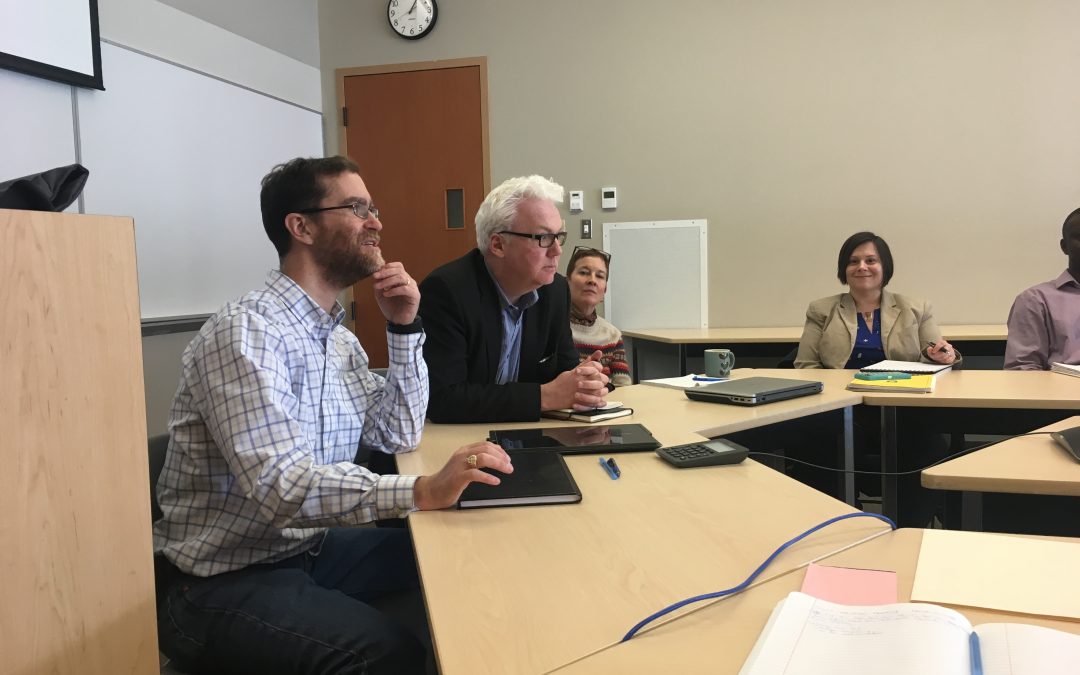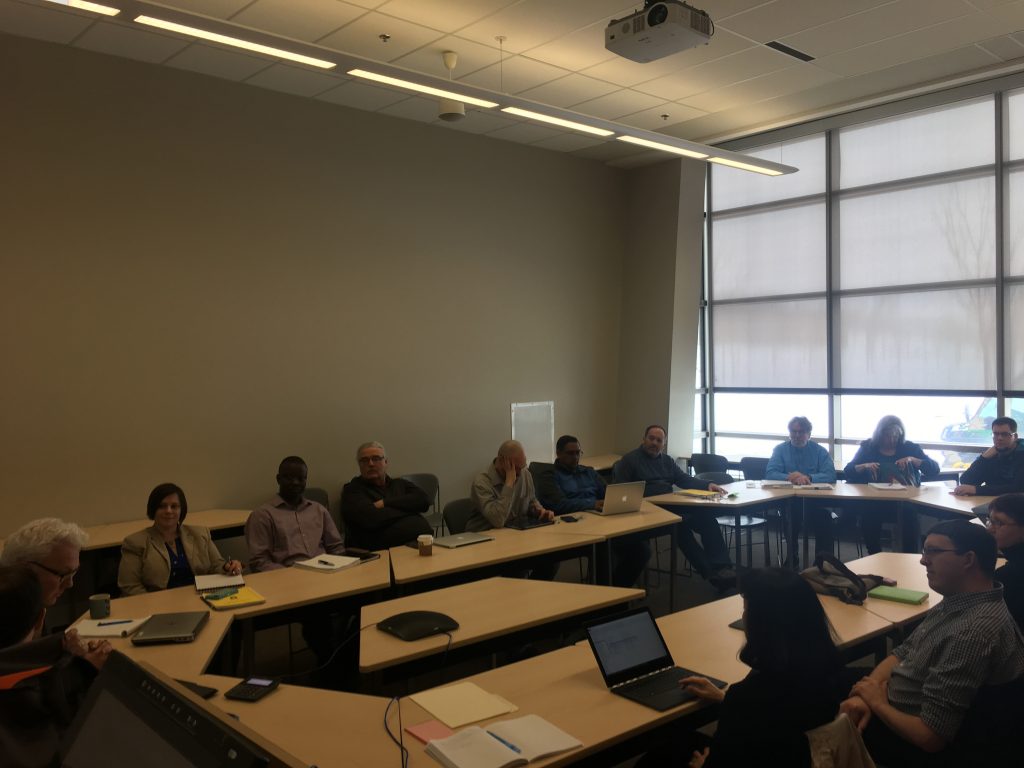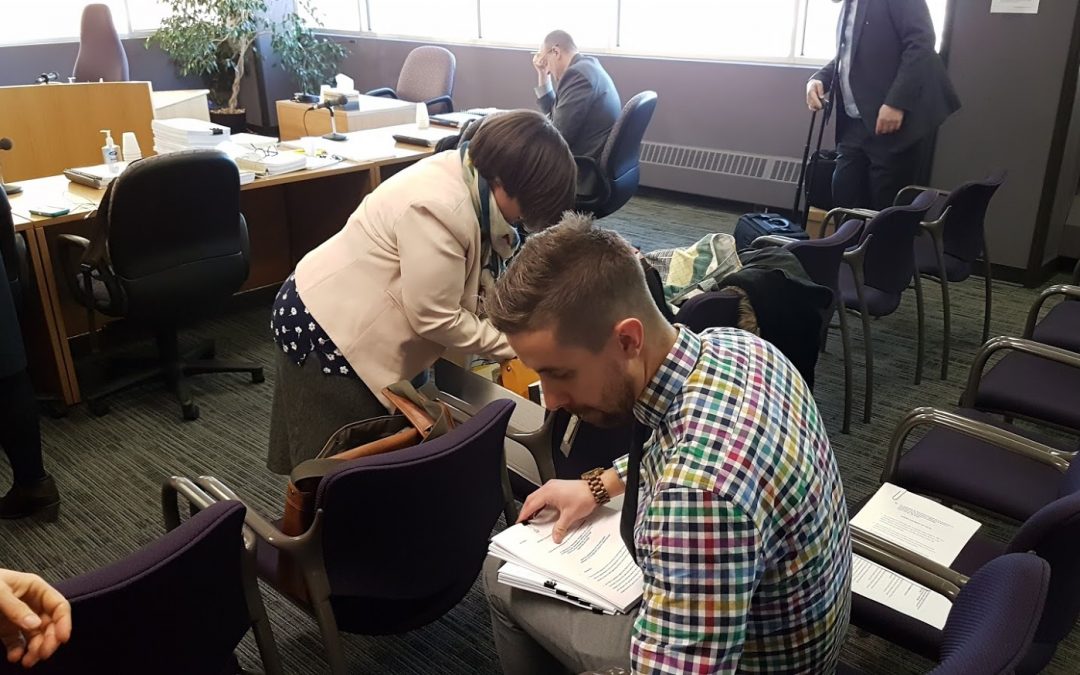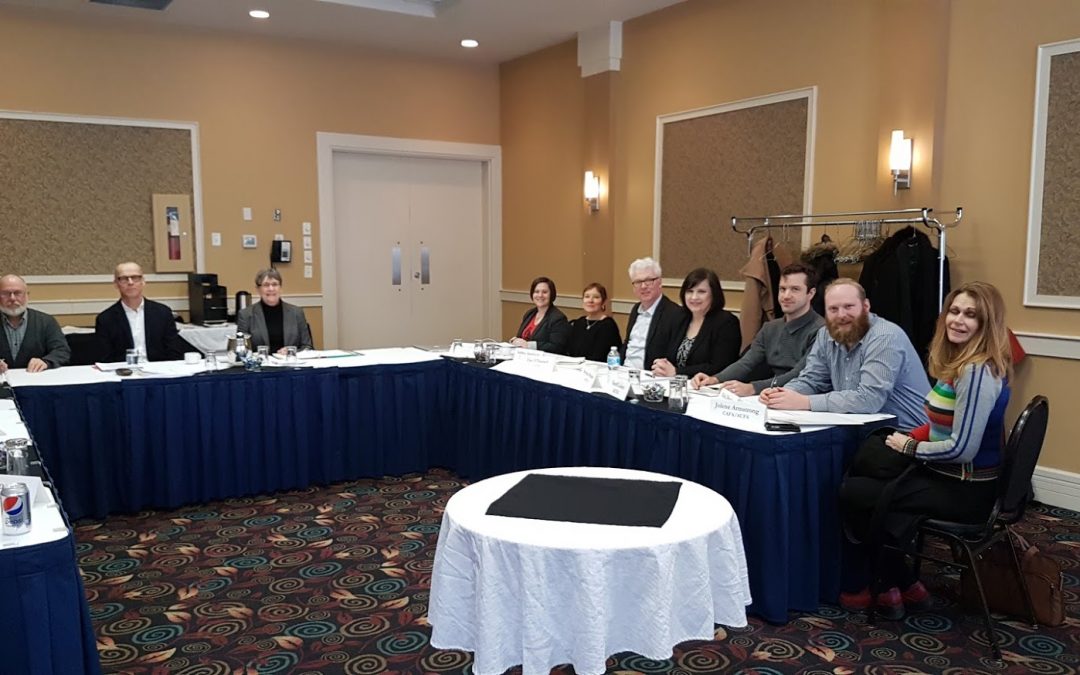
Mar 7, 2018 | Bargaining
The University of Lethbridge Faculty Association (ULFA) joint bargaining committee held a pre-bargaining meeting on March 2. The joint committee consists of members of the Handbooks and Economic Benefits Committees. Its purpose is to support the ULFA bargaining team once negotiations begin.
In previous years, bargaining at the U of L occured at two “tables” (economic benefits and “handbooks,” by which was meant terms and conditions of employment other than money); under the new rules introduced by Bill 7, bargaining between the University and ULFA will now take place at a single table.
At the meeting, bargaining team members Paul Hayes and Dan O’Donnell updated the membership on the current status of bargaining and discussed how the unified committee will work once bargaining begins. Committee members discussed various aspects of our proposed opening positions and topics for future rounds.
The next meeting likely will be scheduled towards the end of March.

Mar 6, 2018 | Bargaining
The University of Lethbridge Faculty Association (ULFA) issued the employer with a “notice to bargain” yesterday, as required by section 59(2) of the Labour Relations Code.
This notice requires the parties to meet and commence bargaining within 30 days, with an exchange of proposal occurring within 14 days of this first meeting. The “Notice to Bargain” is a new requirement in the Post Secondary sector, introduced by Bill 7 and the movement of labour relations from the Post Secondary Learning Act into the Labour Relations Code.
The March 5 letter is the second notice to bargain ULFA has issued. This is because both the number of agreements the two sides are required to bargain and the end date or dates of these agreements is still a matter of dispute between the two parties. (You can read about this beginning here.) The number of agreements was the subject of a hearing before the Alberta Labour Relations Board (ALRB), for which we are awaiting a ruling. In keeping with its position before the ALRB, ULFA’s notice covers the entire Academic Staff bargaining unit, including both Sessionals and Faculty.
At the hearing, the ALRB indicated that it would most likely not rule on the end date(s) of the agreements, leaving this to the parties to determine instead. Since March 3 is both 120 days before June 30th (ULFA’s preferred end date) and 60 days before April 30th (the University’s preferred date), this question is now largely moot. Perhaps more significant is March 22nd, the date on which the Provincial budget will be tabled.
Note
This post is intended to update the membership of ULFA about the current state of negotiations between the Union and the University. The information it contains is provided without prejudice and is intended for a general, non-specialist audience. While every effort has been made to ensure that the information this post contains is accurate, it does not represent an official legal or negotiating position. In the event of a disagreement between this post and an official notice or document, the official document is correct.

Feb 21, 2018 | Bargaining
Representatives of the Board of Governors of the University of Lethbridge and the University of Lethbridge Faculty Association (ULFA) attended a hearing with the Alberta Labour Relations Board (ALRB) in Calgary on Monday, Feb. 12.
The topic of the hearing was ULFA’s request for a ruling on the number of bargaining units and collective agreements between ULFA and the University. ULFA’s position is that there is a single collective agreement that governs the entire Academic Staff at the University and that these academic staff form a single bargaining unit represented by ULFA. The University argues that there are two collective agreements and bargaining units in this designated category: one governing Sessional Lecturers, and a second governing all other members of the academic staff. The issues at stake and the progress of this hearing have been covered extensively, see here, here, here, here, and here.
The participants
The hearing was held before a Labour Relations Board.
ULFA was represented at the hearing by its legal counsel, and ULFA representatives included President Andrea Amelincx, Executive Director Annabree Fairweather, Professional Officer Derrick Antson, and Bargaining Team Members Paul Hayes and Dan O’Donnell.
The University of Lethbridge was represented by its legal counsel, and University representatives included University Librarian Chris Nicol and Dean of the Faculty of Fine Arts Ed Jurkowski. Deans Nicol and Jurkowski are also co-chairs of the University’s negotiating team.
There were three intervenors in this case: the Association of Academic Staff of the University of Alberta (AASUA) and the Faculty Associations of Mount Royal University (MRUFA) and Athabasca University (AUFA).
The process
The parties had agreed to split the case into two parts: one focussing on the underlying legal principles at work; and a second (if necessary) focussing on the historical details of the relationship between the University and ULFA with relation to their bargaining history.
For this first part, the hearing focussed on the basic legal principle at stake in the hearing:
Does the [Labour Relations] Code allow for or preclude the possibility of more than one bargaining unit for the academic staff and/or more than one collective agreement for the academic staff?
The hearing began at approximately 10am with some discussion of process and evidence. The lawyers then presented their cases: ULFA went first, then the three intervenors (Faculty Associations from the University of Alberta, Mount Royal University, and Athabasca University), and finally the University of Lethbridge as respondent. After a brief break, ULFA was given an opportunity to respond briefly to the case made by the University. The hearing ended about 5pm.
Expedited ruling expected
At the conclusion of the hearing, the ALRB Chair indicated that the parties could expect an expedited ruling, but did not give a firm timeline. We will provide an update when we have more information to share.
Note:
This post has been written in order to keep the membership of ULFA informed about the status of this important case. While it attempts to provide an accurate account of the case for a non-specialist audience, it has not been written by lawyers and is without prejudice. Any divergence in this post from the position represented in documents filed with the ALRB is accidental and does not represent the official position of the Association.

Feb 16, 2018 | Bargaining
Essential Services Commissioner, Gwen Gray, and Director of Mediation Services, Don Mitchell, met on Thursday Feb 8 with representatives of the Faculty Associations from the Universities of Lethbridge, Alberta, Calgary, and Athabasca. The purpose of the meeting was to discuss Essential Service Agreements (ESAs).
About Essential Service Agreements
ESAs are a new requirement in the post-secondary sector that were introduced by the provincial government as part of the changes in labour relations introduced last year as part of Bill 7.
Under the legislation (Part 2 Division 15.1 of the Code), “Essential Services” are those services
(a) the interruption of which would endanger the life, personal safety or health of the public, or
(b) that are necessary to the maintenance and administration of the rule of law or public security. (Labour Relations Code, 95.1)
Under the new law, employers and unions are required to negotiate an ESA before any formal steps can be taken to resolve a negotiating impasse (i.e. through mediation, Lockout, or Strike).
How Post-Secondary Institutions differ from other sectors
In many sectors of the economy, Essential Services are quite easy to identify, as the protection of life, health, or safety of the public or the maintenance of law and public security is written into official job descriptions. In addition, in most sectors of the economy, equipment that might prove dangerous in the event of a lockout or a strike is provided and maintained by the employer, who is then easily able to arrange for its maintenance or shut down in the event of job action.
The Post Secondary sector, however, is in this respect quite different from many other industries. Labs, for example, are commonly established by individual researchers using external research money rather than provided by the employer. This can result in highly individualised and customised equipment setups that an employer may find difficult to maintain or shut down safely without assistance or direction from the lab director or other employees.
Because researchers are responsible for establishing their own research programmes, moreover, individual members of the academic staff may have developed duties on their own initiative that impact human health or safety or affect the maintenance or administration of the rule of law or public security. This can mean a much wider exposure to potential harm–including research or service activities that are part of an employee’s duties, but take place off campus with minimal or no involvement of management in their planning. Since these duties are self-assigned, there may also be no single, centralised list of duties that must be assumed by management in the event of a lockout or strike.
Advice for establishing ESAs
Faculty Associations learned that flexibility and collaboration is necessary in developing these agreements. While it can be tempting for institutions to see them as a potential source of leverage in negotiations, it is irresponsible to take a positional approach to their negotiation (in a “positional approach,” parties understand bargaining primarily as a competition for relative advantage rather than as a way of discovering optimum solutions that benefit all involved). We were told that in some sectors, the development of ESAs has been understood as a long-term process involving cooperation between management and labour, in some cases over several negotiating cycles. We were also told of the many tools that exist for resolving impasse in ESA negotiations and of options for producing flexible ESAs that can respond to unforeseen developments and emergencies.
The Situation at the U of L
At the U of L, negotiations regarding the ESA between ULFA and the University have been caught up in our current application to the Alberta Labour Relations Board (ALRB) concerning the number of collective agreements we will be discussing this year (you can follow this case, starting here). If, as ULFA asserts, there is only one collective agreement to be negotiated for the Academic Staff, then there is also only one ESA (each bargaining unit and collective agreement requires an ESA under the new rules). If, on the other hand, as the University claims, there are two collective agreements between the U of L and ULFA, then we must also negotiate two ESAs.
Despite this disagreement, ULFA and the University have discussed ESAs in a preliminary fashion in two meetings and will explore these options in greater detail now that we have more information from the Commissioner.
As we wait to resume negotiations, ULFA is in the process of consulting with its members about any services they may need to continue to provide in the event of a lockout or strike. If you work with potentially dangerous equipment or supplies or conduct research with vulnerable populations (whether as part of self-directed research and service or as required by the university), we are very eager to hear from you. Please consider letting us know at one of our Bargaining Meet and Greet sessions.
Note
This post is intended to update the membership of ULFA about the current state of negotiations between the Union and the University. The information it contains is provided without prejudice and is intended for a general, non-specialist audience. While every effort has been made to ensure that the information this post contains is accurate, it does not represent an official legal or negotiating position. In the event of a disagreement between this post and an official notice or document, the official document is correct.
Feb 8, 2018 | Bargaining
The University of Lethbridge is taking a “heavy handed” approach in its relationship with U of L faculty, reports Labour Relations expert Bob Barnetson in his blog Labour and Employment in Alberta.
The Board of Governors served the University of Lethbridge Faculty Association (ULFA) with a “Notice to Bargain” for Sessional Lecturers on January 22nd. The University and ULFA are parties to a case concerning the legality of these same negotiations that is currently before the Alberta Labour Relations Board (ALRB). The hearing in that case is scheduled for February 12.
In its notice, the University indicated that it intended to negotiate as many as 16 out of the 19 articles governing Sessional Lecturer conditions of employment. (You can read more about the case before the ALRB and other aspects of our ongoing negotiations by following our bargaining blog at ULFA.ca or following ULFA on Facebook or Twitter.)
“Both the act of serving notice and the scope of bargaining appears like a fairly aggressive move to me,” writes Barnetson, a professor of Labour Relations at Athabasca University.
“It is not really clear why the U of L would act this way,” he notes. “The U of L likely wants to bargain these groups separately in order to reduce the strike power of the staff and drive rollbacks,” he writes. “I suspect it is about money and grinding cost out of the sessional contract.”
Barnetson, whose blog follows labour relations across the province, thinks the approach may be related to other recent cases in which the University has come out on the losing side of legal battles with the Faculty Association. “The U of L has become increasingly aggressive with ULFA over the past two years,” he suggests.
You can read the complete blog posting here: http://albertalabour.blogspot.ca/2018/02/alrb-hearing-on-u-of-l-bargaining-units.html.
Note
This post is intended to keep the membership of ULFA informed about issues in labour negotiations between the Union and the University. The information it contains is provided without prejudice and is intended for a general, non-specialist audience. While every effort has been made to ensure that the information this post contains is accurate, it does not represent an official legal or negotiating position of ULFA. In the event of a disagreement between this post and an official notice or document, the official document is correct.
Feb 2, 2018 | Bargaining
On Monday January 22nd, the Board of Governors of the University of Lethbridge issued a “Notice to Bargain” for the “Sessional Lecturers’ Handbook” (SLHB) to the University of Lethbridge Faculty Association (ULFA).
This letter is based on a disputed interpretation of the Post Secondary Learning Act (PSLA) and Labour Relations Code. The University’s interpretation of the Act and Code is the subject of an application for resolution by ULFA to the Alberta Labour Relations Board (ALRB). You can read more about this case and the background to our dispute here, here, here, here, and here. The filings in this case are also public documents. The ALRB scheduled a case-management call on this case for February 1, has a second call tentatively scheduled for Feburary 6, and hearings planned for February 12 and, if necessary, February 13.
Board proposes opening nearly all terms and conditions for negotiations.
In inviting ULFA to begin negotiating the sessionals’ portion of its collective agreement, the University indicates that it intends to open nearly all articles in the SLHB for negotiation–except those having to do with compensation, statutory holidays, personnel files, medical leave, and some schedules. These are
- Objectives
- Article 1 Interpretation
- Article 2 Definitions
- Article 3 Amendments
- Article 4 Application and Exclusions
- Article 5 Recognition
- Article 6 Communication and Information
- Article 7 Delegation
- Article 9 Appointments
- Article 10 Rights and Responsibilities
- Article 11 Performance evaluation
- Article 12 Termination of Appointment
- Article 14 Grievance Procedure
- Article 15 Discipline
- Article 18 Copyright and Patents
- Article 19 Annual Meeting
- Schedule C Negotiation and Impasse
This is an unusually broad set of topics that involve issues ranging from core questions of academic freedom and professional identity to potentially less substantive issues like the definition of terms and processes for discussing issues of mutual interest.
Negotiations on such a broad list of topics has the potential to significantly alter the conditions under which members of the Academic Staff are employed as well as their rights and responsibilities. Since so many of these articles overlap with equivalent (in some cases identical) language in the “Faculty Handbook,” this list is also of interest to members of the professoriate, Librarians, Instructors, and Academic Assistants.
Not a Notice to Bargain
In keeping with our position before the ALRB, ULFA does not consider the Employer’s invitation from January 22 to be a valid Notice. In ULFA’s view, a valid notice must involve the entire Bargaining Unit (in this case, the Sessional Lecturers and Faculty Members, Librarians, and Instructors). In addition, it must refer to the entire collective agreement, again in this case, the Faculty Handbook as well as the SLHB. In a letter to the Employer, ULFA made this position clear. It also indicated that it intends to issue its own Notice to Bargain for the entire Bargaining Unit and Collective Agreement soon after the ALRB hearing in two weeks.
Time will tell
It is important to remember that all negotiating documents from either side, including the University’s letter of January 22nd, are presented “without prejudice” until a final agreement is reached. This means that while the University may have proposed opening all of these topics, that is no guarantee that all these topics will be discussed or that an agreement will be reached on all articles mentioned. It is very common for negotiating teams to alter or withdraw proposals and items for discussion in the course of bargaining. As a rule, moreover, it is easier to withdraw than add items for negotiations. This encourages teams to overestimate what they will discuss, rather than underestimate.
The ULFA negotiating team has trained for various approaches to bargaining, including that represented by the University’s letter of January 22nd. It is fully prepared to begin negotiations once the ALRB has ruled on our application regarding the number of collective agreements the parties are to discuss.
Note
This post is intended to update the membership of ULFA about the current state of negotiations between the Union and the University. The information it contains is provided without prejudice and is intended for a general, non-specialist audience. While every effort has been made to ensure that the information this post contains is accurate, it does not represent an official legal or negotiating position. In the event of a disagreement between this post and an official notice or document, the official document is correct.




